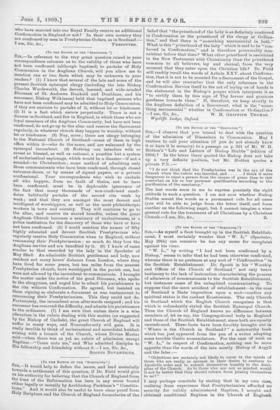[To THE EDITOR OF THE "SPECTATOR.1 SIR,—In reference to the
very great question raised in your correspondence columns as to the validity of those who have not been confirmed (although baptised) to partake of Holy Communion in the Anglican Church, will you allow me to mention one or two facts which may be unknown to your readers ? (1) I know that several of the late and some of the present Scottish episcopal clergy (including the late Bishop Charles Wordsworth, the devout, learned, and wide-minded Diocesan of SL Andrews Duukeld and Dunblane, and his successor, Bishop Wilkinson) held that baptised persona who have not been confirmed may be admitted to Holy Communion, if they are anxious to partake of it, without let or hindrance. (2) It is a fact which occurs perpetually. There is not a diocese in Scotland, and few in England, in which those who are loyal members of the Anglican Community, but have not been confirmed, do not go up to the altar and receive the Sacrament regularly, in whatever church they happen to worship, without let or hindrance. (3) Nay, more ; there are clergy belonging to the National Church of Scotland—some of them in high office within it—who do the same, and are welcomed by the episcopal incumbent. (4) Nothing can interfere with or arrest so blessed, as well as rational, a practice but a system of ecclesiastical espionage, which would be a disaster—if not a scandal—to Christendom ; some method of admitting only those communicants who have been confirmed, through closed entrance-doors, or by means of signed papers, or a private confessional. Your correspondents who wish to exclude all who happen, from no fault of theirs, not to have been confirmed, must be in deplorable ignorance of the fact that many thousands of non-confirmed candi- dates habitually partake of tho sacred rite week by Week; and that they are amongst the most devout and intelligent of worshippers, as well as the most philanthropic workers in town and country. They will continue to go to the altar, and receive its sacred benefits, unless the great Anglican Church becomes a seminary of exclusiveness, or a police institution for the discovery of those who have or have not been confirmed. (5) I could mention the names of fifty highly educated and devout Scottish Presbyterians who regularly receive Holy Communion when in England, without renouncing their Presbyterianism ; so much do they love the Anglican service and are benefited by it. (6) I know of cases Similar to that recorded by the lady in the Spectator of May 22nd. An admirable Scottish gentleman and lady, now resident not many hours' distance from London, where they , have lived for some years, but ten miles from the nearest Presbyterian church, have worshipped in the parish one, but were not allowed by the incumbent to communicate. I brought the matter under the notice of the good Diocesan, who spoke to the clergyman, and urged him to admit his parishioners to the rite without Confirmation. He agreed, but insisted on them signing so elaborate a document as was tantamount to renouncing their Presbyterianism. This they could not do. Fortunately, the incumbent soon afterwards resigned ; and hie successor has removed the difficulty, and admits his parishioners to the ordinance. (7) I am sure that unless there is a wise alteration in the rubric dealing with this matter (as suggested by the Bishop of Carlisle), the great Church of England will suffer in many ways, and Nonconformity will gain. It is really terrible to think of ecclesiastical and sacerdotal hubbub arising with a branch of the Church, whose Divine Master said—when there was as yet no rubric of admission except Baptism—" Come unto me," and Who admitted disciples to His fellowship and friendship without it.—I am, Sir, &c.,
SCOTUS NOVANTICUS.










































 Previous page
Previous page